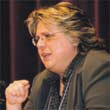“On the Verge”
Portland Newspapers, Portland, ME
http://20below.mainetoday.com/press/verge/
For “On the Verge,” a fresh and compelling look at teen life that broke free of stereotypes and resisted adult influences. Using pizza parties, disposable cameras and hours of conversations with teens, it reflected the authenticity of a group of citizens not traditionally heard from.
 Jeannine Guttman
Jeannine Guttman
Executive Editor
Portland Newspapers
Civic journalism I view as kick-ass journalism. It is really revolutionary journalism. It gives voice to the voiceless, something I was taught at this university was a core value of this profession. It also breaks the silences that sometimes a community uses to mask the truth about what’s really going on.
Barbara Walsh, our Pulitzer Prize-winning reporter, worked on this series for 15 months. When I first told her that I wanted to tap into [our teen] community she said, “Great, I got it all set up: Kids who murder, kids who rape, kids on drugs.”
I said, “No, Barbara. You know, the average kids.” And she said, “How do I do that?” I said, “I’m not really sure.”
The Portland City Council passed an anti-loitering ordinance and kids felt really attacked, that they had no place to go. If you were a young person in Maine, you were basically viewed as kind of a criminal. The kids felt that no one listened to them, no one valued them and that they were invisible.
We had a forum. It was after Columbine. At first, the kids were very happy to be there. Then, after about 20 minutes, they said: “You know, you people in the media, you only want to talk to us when there’s a shooting at a school, when a kid is arrested for something, when there’s drinking at a sports event. You never really listen to us.” We had to overcome a credibility issue with them.
Barbara produced a five-part series. For each part, she interviewed more than 100 teen-agers. We decided to limit dramatically the adult voices in the series. So no parents to balance what the kids were saying. No psychiatrists or psychologists or teen sociologists, who observe from a distance and comment on these behaviors. We just talked to kids.
In part three, kids from divorced families told us their lives were terrible. Their families were broken. The adult community did not react very well. Most parents who had been through this had developed a mythology: I’m being a good parent. When the story came out, they had to face the reality that their kids saw this differently. One of the fathers asked us, “Why didn’t you call me and get my side of the story?”
In fact we’ve heard that story, haven’t we? We haven’t heard this story. That’s why I say that civic journalism is so revolutionary. The stories we tell people are so predictable and so old you can recite them before you get beyond the byline.
This stuff is great. All of what you’ve heard here today, this is amazing stuff, and when readers read it, they know it when they see it – they react really differently. It’s almost as though you have found some new genre of journalism.
